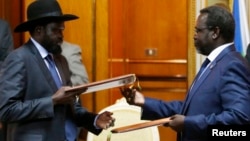An official in South Sudan's Foreign Ministry says President Salva Kiir is expected to meet with rebel leader Riek Machar in Tanzania. The meeting comes as the government and rebels continue talks to end a violent political conflict that has torn the country apart. This is the first time the two leaders will have met since signing a failed cease-fire deal in May.
South Sudan's Foreign Ministry spokesman Mawien Makol Arik told VOA that President Kiir is attending a meeting Monday of the country's ruling political party, the SPLM, in Arusha along with former vice president Machar.
Both were members of the party until a political dispute between the two turned violent in December last year, spiraling into an all-out conflict that has left more than 10,000 people dead and displaced more than 1.5 million others.
Arik, speaking by phone from Juba, said the people of South Sudan hope the meeting will help produce a peace deal.
“We are hoping that the two leaders will reach some kind of compromise,” he said, “to put aside the problems that are now engulfing the country.”
The two leaders were invited to Arusha by Tanzanian President Jakaya Kikwete.
Kiir and Machar signed a peace deal in Ethiopia in May as part of ongoing negotiations between the two sides mediated by the East African bloc of nations IGAD.
However that deal, like three previous cease-fire agreements, fell apart soon after it was signed.
Arik said the point of the Arusha talks is to try to settle this matter within the party.
He said, “the SPLM-in-opposition now, which is led by Riek Machar, and the SPLM which is still ruling the country can come up with some kind of agreement as to how they can handle this issue and come back as one party.”
As part of a previous deal, the two sides agreed to the establishment of a transitional government of national unity, but there has been slow progress in working out the details.
Meantime, humanitarian agencies warn a food crisis could worsen in the coming months without sustained peace, as the ongoing conflict has impeded access to the most vulnerable populations.




